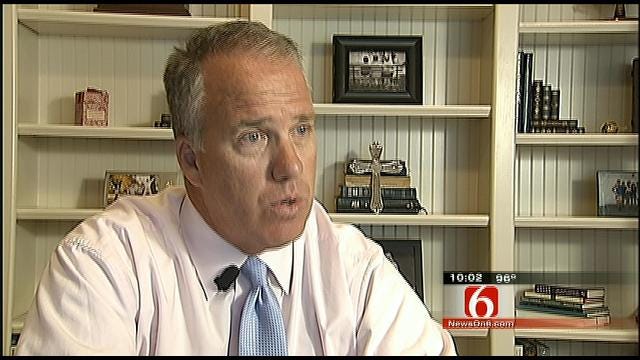Oklahoma Lawmaker Explains Insurance Exchanges
An "insurance exchange" is basically a large database through which states can offer consumers a choice of private or public coverage, all in one place.Thursday, June 28th 2012, 10:47 pm
The next step in the roll-out of the Affordable Care Act, which was upheld by the Supreme Court Thursday, is for all states to either have a health insurance exchange in place by the first day of 2014, or default to a federal exchange program.
That's a tight deadline for Oklahoma, which stopped planning an exchange in hopes that the law would be shot down.
An "insurance exchange" is basically a large database through which states can offer consumers a choice of private or public coverage, all in one place. An exchange is also supposed to create an administrative mechanism for enrollment in the included plans.
The intention is to simplify the process for consumers and keep prices competitive.
Oklahoma lawmakers can choose a state-based exchange, a federally-facilitated exchange, or a hybrid plan called a federal-state partnership exchange.
"A federal insurance exchange—we don't have control," said State Representative Glen Mulready (R-Tulsa). "The federal government will make those decisions. A state-based exchange—we get to make those decisions. We can have our insurance commissioner overseeing that and making those sort of decisions."
6/28/2012 Related Story: Supreme Court's Healthcare Decision Brings Cheers, Jeers
Mulready was on the joint committee that originally researched the President's healthcare law and how it would affect Oklahoma.
He says the questions haven't changed.
"What are we going to do as a state? How can we retain some control and make decisions that are best for Oklahoma?" Mulready said.
There's a lot of technology development, data sharing, and expenses that must go into a health insurance exchange.
"All kinds of estimates, but $10 million on up probably to establish and continue to maintain and run an exchange with all the components that are required," Mulready said.
One of the biggest challenges facing Oklahoma is the deadline.
By November 16, states must submit a blueprint explaining which exchange model they chose.
Then the U.S. Department of Health and Human Services will begin certifying each state's progress in January 2013, and those exchanges must be running by January 2014.
If a state cannot meet the deadlines, they'll be forced to default to one of the federal exchange plans.
"I believe the better approach is a state based exchange because Oklahomans will know what's best for Oklahomans versus the federal government," Mulready said.
For more information about health insurance exchanges and how they might work, check out this brief prepared by the Kaiser Family Foundation.
More Like This
June 28th, 2012
January 2nd, 2025
September 29th, 2024
September 17th, 2024
Top Headlines
January 6th, 2025
January 6th, 2025
January 6th, 2025
January 6th, 2025










